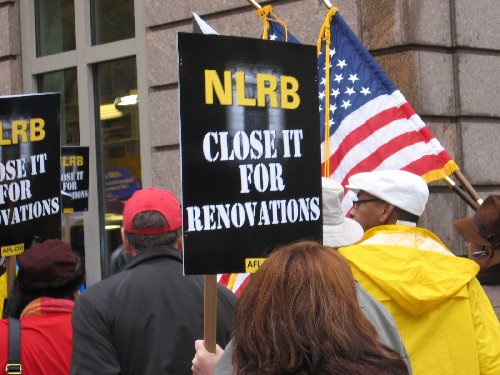In BE and K Construction Co. v. National Labor Relations Board, 536 U.S. 516 (2002), the Supreme Court held that the National Labor Relations Board (NLRB) could not impose liability on an employer for filing a losing retaliatory lawsuit that was not objectively baseless. In so doing, the Court broadly interpreted the First Amendment right to petition.
Court said NRLB could not assess liability on the company
The opinion drafted for a unanimous Court by Justice Sandra Day O’Connor denied the NLRB’s authority to assess liability on the construction company even though all the employer’s claims had been withdrawn or dismissed.
The Court viewed the decision as a clarification of Bill Johnson’s Restaurants, Inc. v. National Labor Relations Board (1983), in which the Court reiterated that the First Amendment recognizes a right to petition. California Motor Transport Co. v. Trucking Unlimited (1972) extended this right to include all branches of government, but limited “sham petitioning.” (The NLRB is an independent federal agency.)
Petitions successful and unsuccessful are protected by First Amendment
Choosing to focus not on “the standard for enjoining ongoing suits but on the standard for declaring completed suits unlawful,” the Court believed itself not bound by its own past dicta. Granted that “concerns related to the right of petition must be greater when enjoining ongoing litigation than when penalizing completed litigation,” such reasoning by analogy” at most suggests that injunctions may raise greater First Amendment concerns, not that after-the-fact penalties raise no concerns.”
The Court held it was important to distinguish suits that were “both objectively baseless and subjectively motivated by an unlawful purpose” from those that were “reasonably based but unsuccessful.” Even unsuccessful suits might present genuine grievances. After all, the First Amendment protects both successful and unsuccessful petitioning.
Thus the Court found that “while baseless suits can be seen as analogous to false statements, that analogy does not directly extent to suits that are unsuccessful but reasonably based.” Ill will is not a sufficient basis for finding a “retaliatory motive,” and the statutory authorization for the NLRB showed no intention of penalizing such suits.
Justices Antonin Scalia and Clarence Thomas, in a concurring opinion, argued that the decision indicated that the Court was heading in the direction of interpreting the National Labor Relations Act (NLRA), like the Sherman Act, “to prohibit only lawsuits that are both objectively baseless and subjectively intended to abuse process.”
Scalia thought it dangerous to give an executive agency authority to punish “a reasonably based suit filed in an Article III court whenever it concludes — insulated from de novo judicial review by the substantial-evidence standard . . . — that the complainant had one motive rather than another.”
Justice Stephen G. Breyer, joined by Justices John Paul Stevens, David H. Souter, and Ruth Bader Ginsburg, authored another concurring opinion, accusing the Court of reopening issues settled by Bill Johnson’s Restaurants, Inc.
John Vile is professor of political science and dean of the Honors College at Middle Tennessee State University. He is co-editor of the Encyclopedia of the First Amendment. This article was originally published in 2009.

